‘Home away from home’
The Middle Eastern Student Association hosted the annual Middle Eastern Night March 24.
People on stage in the CUB senior ballroom during Middle Eastern Night, March 24.
March 29, 2023
The hospitality and warmth of Middle Eastern culture resonated through the Compton Union Building senior ballroom on this year’s Middle Eastern Night, held March 24.
Almost 400 seats packed the ballroom, which was covered with red cloth, lanterns, candles, teapots and pitchers of lemonade and orange juice. Surrounding the tables were posters providing details of different Middle Eastern countries’ demographics. Hosted by the Middle Eastern Student Association, the event featured food, speeches, music, dances, readings, calligraphy and henna.
The number of attendees for this year’s Middle Eastern Night far exceeded the 380-person seat limit, MESA president Ahmed Al Busaidi said.
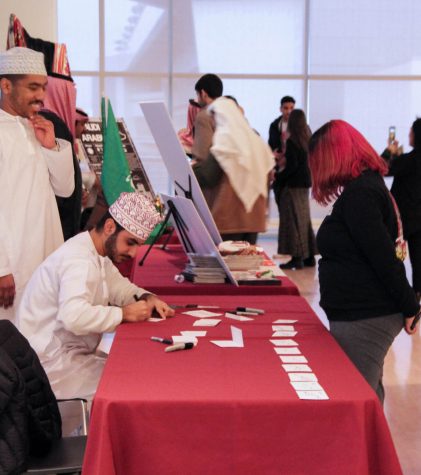
MESA planned the event over the course of a semester, Al Busaidi said. Though MESA hosted the night, the Omani Student Association and Saudi Students Association were also present.
“[Middle Eastern Night] allows for more Middle Eastern Students to feel at home as well as introducing other students to our culture,” MESA vice president Salam Kassem said. “It’s also a great way to make friends and meet people.”
The event kicked off with a note of welcome from India Abbas (they/them), MESA treasurer and the night’s MC. They introduced members of MESA and promoted the association’s social media.
“Tonight is a night to celebrate the Middle East and our vibrant and diverse cultures,” Abbas said. “We aim to expose you to delicious foods, amazing activities and surprising facts some of you may not be accustomed to and hope to provide home away from home for our Middle Eastern folks here tonight.”
A Quran reading from Khaled Al-Tawari followed, celebrating the event and the second night of Ramadan.
After the reading, Abbas directed attendees to the food table for Iftar, the meal eaten after sunset to breakfast during Ramadan, as well as to a photo booth, calligraphy booth and table for those who wanted to get a henna tattoo.
During dinner, a member went on stage to do Adhan, or a call to prayer, for those who were fasting for Ramadan. People who were fasting and needed to pray were also directed by Abbas to prayer rooms in the CUB.
A speech about Middle Eastern culture by professor Charles Weller followed the dinner proceedings. The speech, titled “Even a Small House has Room for a Thousand Guests,” explained the importance and prevalence of hospitality in Middle Eastern culture.
Next, an SSA representative thanked MESA for inviting the SSA to Middle Eastern Night and gave context about the dance performance “Ardah,” or “Sword Dance,” that followed. “Ardah” is a Saudi Arabian traditional folk dance performed in celebration of Saudi Flag Day.
Abbas called up the OSA after talking about the country of Oman and explaining its cultural traditions and arts. One of these arts is Haboot, which poets use as a platform to banter, joke and discuss specific issues, Abbas said. OSA members sang Haboot for the event and received a round of applause from the audience.
Before the final event of the night began, MESA secretary Pegah Nejad invited the audience to test their knowledge of the Middle East in a game of Kahoot! The top five winners won prizes ranging from bobbleheads to medals to a dartboard for the first-place winner.
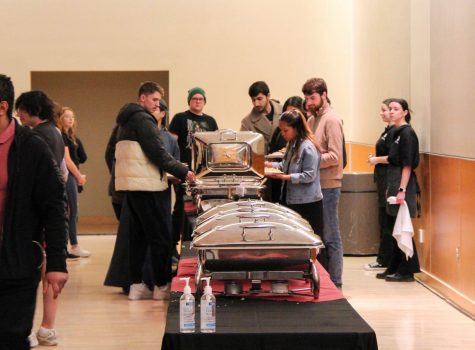
“I feel incredible about WSU hosting an event like this,” MESA public relations Zahra Ahmed wrote in an email. “I feel like as a predominantly-white institution, funds should go into promoting people of color; the representation and education is needed.”
The final performance was by the Jafra Dabke Team from Seattle.
Dabke is a traditional cultural dance with Middle Eastern origins. Typically, participating dancers hold hands while moving around and performing traditional stomping movements in a large circle.
After the team performed, they stepped down from the stage and greeted some audience members who were standing and watching the performance.
The team gathered the audience members and formed a line, joining hands. Eventually, more of the audience members got out of their seats and joined the line in dance. Lead by the team, the long line of people circled the ballroom multiple times as they tried to follow the team dance leader’s rhythm and moves.
Music, with a drummer playing to the beat of the music, accompanied the dance.
After the team’s performance, Ahmed called for a round of applause for the team and promoted their Instagram page.
Abbas then invited Al Busaidi on stage, who concluded the event with a speech acknowledging everyone who participated in Middle Eastern Night.
“To me culture is everything, culture brings you up, culture makes you who you are … the Middle East is home to me, it’s the place where I feel safe,” Al Busaidi said. “We come here to study and hopefully … make people know about the Middle East more.”


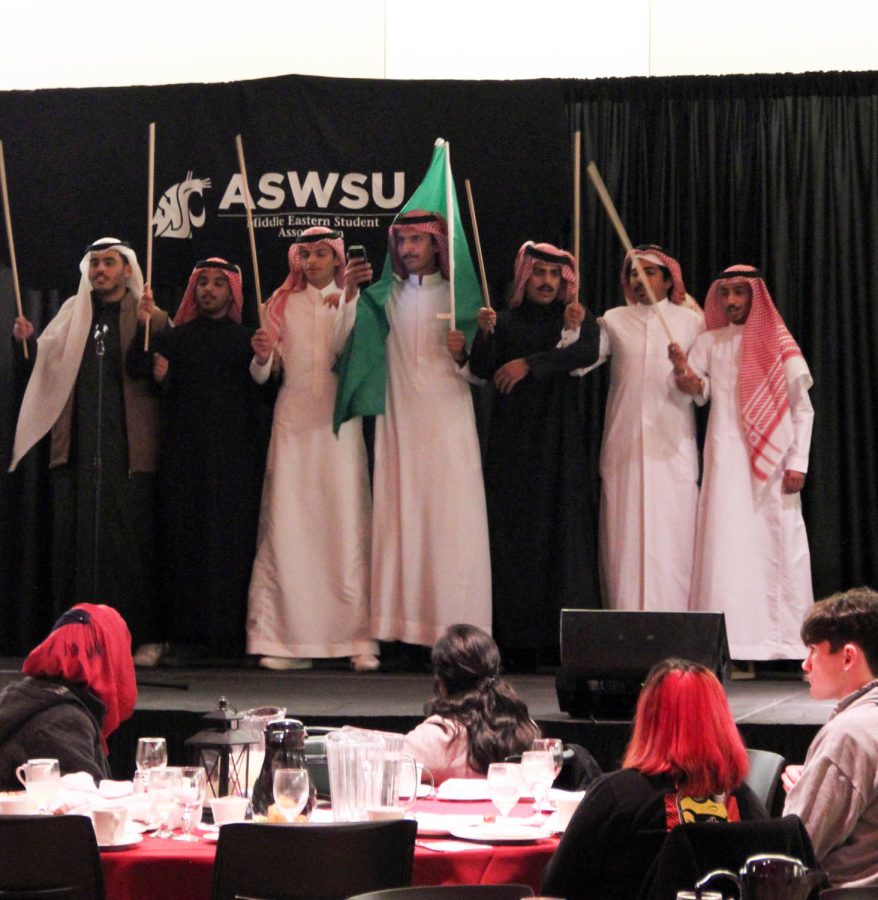
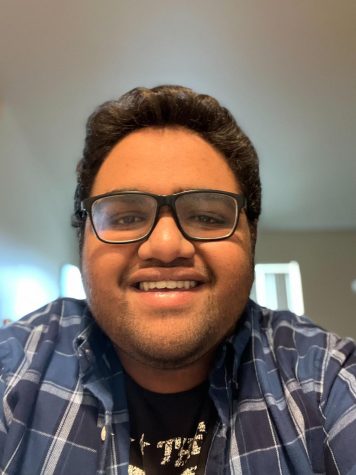
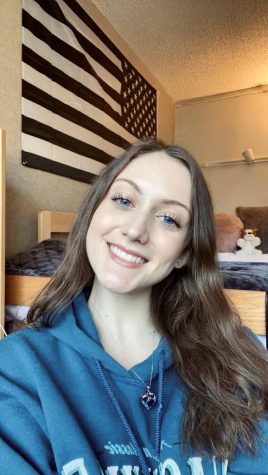









Ahmed • Mar 30, 2023 at 1:54 pm
Hi, I’ll give you my email in the message. I want to send me the video when we was dancing Saudi Arabia, student.